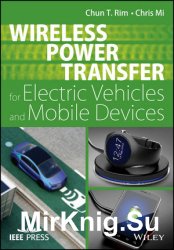Wireless Power Transfer for Electric Vehicles and Mobile Devices
- Добавил: decomeron
- Дата: 5-06-2017, 18:15
- Комментариев: 0

Название: Wireless Power Transfer for Electric Vehicles and Mobile Devices
Издательство: Wiley-IEEE Press
Автор: Chun T. Rim, Chris Mi
Год: July 2017
Количество страниц:632
Язык: English
Формат: pdf
Размер:37 Mb
From mobile, cable-free re-charging of electric vehicles, smart phones and laptops to collecting solar electricity from orbiting solar farms, wireless power transfer (WPT) technologies offer consumers and society enormous benefits. Written by innovators in the field, this comprehensive resource explains the fundamental principles and latest advances in WPT and illustrates key applications of this emergent technology.
Key features and coverage include:
The fundamental principles of WPT to practical applications on dynamic charging and static charging of EVs and smartphones.
Theories for inductive power transfer (IPT) such as the coupled inductor model, gyrator circuit model, and magnetic mirror model.
IPTs for road powered EVs, including controller, compensation circuit, electro-magnetic field cancel, large tolerance, power rail segmentation, and foreign object detection.
IPTs for static charging for EVs and large tolerance and capacitive charging issues, as well as IPT mobile applications such as free space omnidirectional IPT by dipole coils and 2D IPT for robots.
Principle and applications of capacitive power transfer.
Synthesized magnetic field focusing, wireless nuclear instrumentation, and future WPT.
A technical asset for engineers in the power electronics, internet of things and automotive sectors, Wireless Power Transfer for Electric Vehicles and Mobile Devices is an essential design and analysis guide and an important reference for graduate and higher undergraduate students preparing for careers in these industries.
Table of Contents
Part I. Introduction
Chapter 1. Introduction to Mobile Power Electronics
Chapter 2. Introduction to Wireless Power Transfer (WPT)
Chapter 3. Introduction to Electric Vehicles (EVs)
Part II. Theories for Inductive Power Transfer (IPT)
Chapter 4. Coupled Coil Model
Chapter 5. Gyrator Circuit Model
Chapter 6. Magnetic Mirror Model
Chapter 7. General Unified Dynamic Phasor
Part III. Dynamic Charging for Road powered Electric Vehicles (RPEVs)
Chapter 8. Introduction to Dynamic Charging
Chapter 9. History of RPEVs
Chapter 10. Narrow Width Single Phase Power Rail (I-type)
Chapter 11. Narrow Width Dual Phase Power Rail (I-type)
Chapter 12. Ultra Slim Power Rail (S-type)
Chapter 13. Controller Design of Dynamic Chargers
Chapter 14. Compensation Circuit
Chapter 15. Electro-magnetic Field (EMF) Cancel
Chapter 16. Large Tolerance Design
Chapter 17. Power Rail Segmentation and Deployment
Part IV. Static Charging for Pure EVs and Plug-in Hybrid EVs
Chapter 18. Introduction to Static Charging
Chapter 19. Asymmetric Coils for Large Tolerance EV Chargers
Chapter 20. DQ Coils for Large Tolerance EV Chargers
Chapter 21. Capacitive Power Transfer for EV Chargers
Chapter 22. Foreign Object Detection
Part V. Mobile Applications for Phones and Robots
Chapter 23. Review of Coupled Magnetic Resonance System (CMRS)
Chapter 24. Mid-Range IPT by Dipole Coils
Chapter 25. Long Range IPT by Dipole Coils
Chapter 26. Free Space Omnidirectional Mobile Chargers
Chapter 27. 2D Omnidirectional IPT for Robots
Part VI. Special Applications of Wireless Power
Chapter 28. Magnetic Field Focusing
Chapter 29. Wireless Nuclear Instrumentation
Chapter 30. The Futures of Wireless Power
Author Information
DR CHUN T. RIM developed the wireless power transfer (WPT) of on-line electric vehicles that was selected as 'the 50 Best Inventions of 2010' by TIME and 'the first of 10 emerging technologies in 2013' by the World Economic Forum. Dr. Rim also developed WPT for stationary EV charging, mobile devices, robots, and drones. He demonstrated the first 5m and 12m distance WPT using innovative dipole coils and also envisioned new theories for WPT such as magnetic mirror, gyrator circuit model, and phasor transformation. Since 2013, Dr. Rim has served as an Associate Editor of IEEE Trans. on Power Electronics (TPEL) and IEEE JESTPE. He also served as a Guest Editor of Special Issue on WPT at TPEL, JESTPE, TPEL, and Trans. on Industrial Electronics. He has served as the General Chair of 2015/2016/2017 IEEE WoW and published more than 160 articles, 14 books, and 150 patents, mostly on WPT.
DR. CHRIS MI is a Fellow and Professor at San Diego State University. His research interests are in electric and hybrid vehicles. He has taught tutorials and seminars on the subject of HEVs/PHEVs for numerous government agencies and global companies. Dr. Chris Mi started his research in wireless power transfer (WPT) in 2008. His team has developed a number of unique topologies of WPT systems, including the double sided LCC-compensated topology, the large power capacitive wireless power transfer (CPT) technology, and low-ripple dynamic WPT. Dr. Mi is an Area Editor of IEEE Transactions on Vehicular Technology and was an Associate Editor of IEEE Transactions on Power Electronics and IEEE Transactions on Industry Applications.
depositfiles.com
turbobit.net
Внимание
Уважаемый посетитель, Вы зашли на сайт как незарегистрированный пользователь.
Мы рекомендуем Вам зарегистрироваться либо войти на сайт под своим именем.
Уважаемый посетитель, Вы зашли на сайт как незарегистрированный пользователь.
Мы рекомендуем Вам зарегистрироваться либо войти на сайт под своим именем.
Информация
Посетители, находящиеся в группе Гости, не могут оставлять комментарии к данной публикации.
Посетители, находящиеся в группе Гости, не могут оставлять комментарии к данной публикации.
